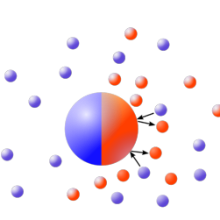Large deviation theory
The mathematical framework to prove statements like the thermodynamic uncertainty relation is provided by large deviation theory, which is concerned with the rate of exponential decay of probabilities. Unlike the central limit theorem, results obtained using the theory are not limited to realizations close to typical cases but apply to the distribution as a whole (hence the name). For this reason, it can be applied to a rather broad class of problems arising in stochastic thermodynamics.
The thermodynamic uncertainty relation, for example, turns out to be the manifestation of a much more general bound that applies to the whole cumulant generating function, and is not limited to mean and variance.
For studying the validity of detailed fluctuation theorems or absence thereof, large deviation theory also proves to be an invaluable tool. Here it is crucial not to rely on methods on the level of the central limit theorem, since Gaussian distributions satisfy a detailed fluctuation theorem by construction.
Related Publications
- Large deviation function for a driven underdamped particle in a periodic potential, L. P. Fischer, P. Pietzonka, and U. Seifert, Phys. Rev. E 97, 022143 (2018), Abstract, Download
- Fine-structured large deviations and the fluctuation theorem: molecular motors and beyond, P. Pietzonka, E. Zimmermann, and U. Seifert, Europhys. Lett. 107, 20002 (2014), Abstract, Download
- Fluctuations of apparent entropy production in networks with hidden slow degrees of freedom, M. Uhl, P. Pietzonka, and U. Seifert, J. Stat. Mech. 2018, 023203 (2018), Abstract, Download
- Extreme fluctuations of active Brownian motion, P. Pietzonka, K. Kleinbeck, and U. Seifert, New J. Phys. 18, 052001 (2016), Abstract, Download
- The large deviation function for entropy production: the optimal trajectory and the role of fluctuations, T. Speck, A. Engel, and U. Seifert, J. Stat. Mech. 2012, P12001 (2012), Abstract, Download
- Large deviation function for entropy production in driven one-dimensional systems, J. Mehl, T. Speck, and U. Seifert, Phys. Rev. E 78, 011123 (2008), Abstract, Download



